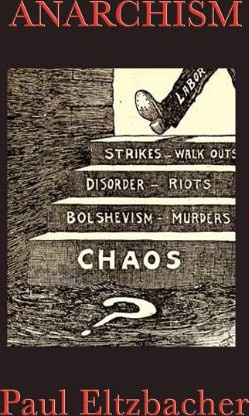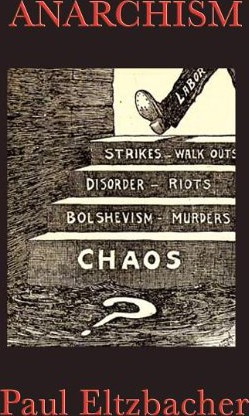Alexander Berkman - What Is Communist Anarchism?
Here you can read online Alexander Berkman - What Is Communist Anarchism? full text of the book (entire story) in english for free. Download pdf and epub, get meaning, cover and reviews about this ebook. year: 1929, genre: Politics. Description of the work, (preface) as well as reviews are available. Best literature library LitArk.com created for fans of good reading and offers a wide selection of genres:
Romance novel
Science fiction
Adventure
Detective
Science
History
Home and family
Prose
Art
Politics
Computer
Non-fiction
Religion
Business
Children
Humor
Choose a favorite category and find really read worthwhile books. Enjoy immersion in the world of imagination, feel the emotions of the characters or learn something new for yourself, make an fascinating discovery.

- Book:What Is Communist Anarchism?
- Author:
- Genre:
- Year:1929
- Rating:5 / 5
- Favourites:Add to favourites
- Your mark:
- 100
- 1
- 2
- 3
- 4
- 5
What Is Communist Anarchism?: summary, description and annotation
We offer to read an annotation, description, summary or preface (depends on what the author of the book "What Is Communist Anarchism?" wrote himself). If you haven't found the necessary information about the book — write in the comments, we will try to find it.
What Is Communist Anarchism? — read online for free the complete book (whole text) full work
Below is the text of the book, divided by pages. System saving the place of the last page read, allows you to conveniently read the book "What Is Communist Anarchism?" online for free, without having to search again every time where you left off. Put a bookmark, and you can go to the page where you finished reading at any time.
Font size:
Interval:
Bookmark:
I consider anarchism the most rational and practical conception of a social life in freedom and harmony. I am convinced that its realization is a certainty in the course of human development.
The time of that realization will depend on two factors: first, on how soon existing conditions will grow spiritually and physically unbearable to considerable portions of mankind, particularly to the laboring classes; and, secondly, on the degree in which Anarchist views will become understood and accepted.
Our social institutions are founded on certain ideas; as long as the latter are generally believed, the institutions built on them are safe. Government remains strong because people think political authority and legal compulsion necessary. Capitalism will continue as long as such an economic system is considered adequate and just. The weakening of the ideas which support the evil and oppressive present-day conditions means the ultimate breakdown of government and capitalism. Progress consists in abolishing what man has outlived and substituting in its place a more suitable environment.
It must be evident even to the casual observer that society is undergoing a radical change in its fundamental conceptions. The World War and the Russian Revolution are the main causes of it. The war has unmasked the vicious character of capitalist competition and the murderous incompetency of governments to settle quarrels among nations, or rather among the ruling financial cliques. It is because the people are losing faith in the old methods that the Great Powers are now compelled to discuss limitation of armaments and even the outlawing of war. It is not so long ago that the very suggestion of such a possibility met with utmost scorn and ridicule.
Similarly is breaking down the belief in other established institutions. Capitalism still works, but doubt about its expediency and justice is gnawing at the heart of ever-widening social circles. The Russian Revolution has broadcasted ideas and feelings that are undermining capitalist society, particularly its economic bases and the sanctity of private ownership of the means of social existence. For not only in Russia did the October change take place: it has influenced the masses throughout the world. The cherished superstition that what exists is permanent has been shaken beyond recovery.
The war, the Russian Revolution, and the post-war developments have combined also to disillusion vast numbers about Socialism. It is literally true that, like Christianity, Socialism has conquered the world by defeating itself. The Socialist parties now run or help to run most of the European governments, but the people do not believe any more that they are different from other bourgeois rgimes. They feel that Socialism has failed and is bankrupt.
In like manner have the Bolsheviks proven that Marxian dogma and Leninist principles can lead only to dictatorship and reaction.
To the Anarchists there is nothing surprising in all this. They have always claimed that the State is destructive to individual liberty and social harmony, and that only the abolition of coercive authority and material inequality can solve our political, economic and national problems. But their arguments, though based on the age-long experience of man, seemed mere theory to the present generation, until the events of the last two decades have demonstrated in actual life the truth of the Anarchist position.
The breakdown of Socialism and of Bolshevism has cleared the way for Anarchism.
There is considerable literature on Anarchism, but most of its larger works were written before the World War. The experience of the recent past has been vital and has made certain revisions necessary in the Anarchist attitude and argumentation. Though the basic propositions remain the same, some modifications of practical application are dictated by the facts of current history. The lessons of the Russian Revolution in particular call for a new approach to various important problems, chief among them the character and activities of the social revolution.
Furthermore, Anarchist books, with few exceptions, are not accessible to the understanding of the average reader. It is the common failing of most works dealing with social questions that they are written on the assumption that the reader is already familiar to a considerable extent with the subject, which is generally not the case at all. As a result there are very few books treating of social problems in a sufficiently simple and intelligible manner.
For the above reason I consider a restatement of the Anarchist position very much needed at this time a restatement in the plainest and clearest terms which can be understood by every one. That is, an ABC of Anarchism.
With that object in view the following pages have been written.
Paris, 1928.
I want to tell you about Anarchism.
I want to tell you what Anarchism is, because I think it is well you should know it. Also because so little is known about it, and what is known is generally hearsay and mostly false.
I want to tell you about it, because I believe that Anarchism is the finest and biggest thing man has ever thought of; the only thing that can give you liberty and well-being, and bring peace and joy to the world.
I want to tell you about it in such plain and simple language that there will be no misunderstanding it. Big words and high sounding phrases serve only to confuse. Straight thinking means plain speaking.
But before I tell you what Anarchism is, I want to tell you what it is not.
That is necessary because so much falsehood has been spread about Anarchism. Even intelligent persons often have entirely wrong notions about it. Some people talk about Anarchism without knowing a thing about it. And some lie about Anarchism, because they dont want you to know the truth about it.
Anarchism has many enemies; they wont tell you the truth about it. Why Anarchism has enemies and who they are, you will see later, in the course of this story. Just now I can tell you that neither your political boss nor your employer, neither the capitalist nor the policeman will speak to you honestly about Anarchism. Most of them know nothing about it, and all of them hate it. Their newspapers and publications the capitalistic press are also against it.
Even most Socialists and Bolsheviks misrepresent Anarchism. True, the majority of them dont know any better. But those who do know better also often lie about Anarchism and speak of it as disorder and chaos. You can see for yourself how dishonest they are in this: the greatest teachers of Socialism Karl Marx and Friedrich Engels had taught that Anarchism would come from Socialism. They said that we must first have Socialism, but that after Socialism there will be Anarchism, and that it would be a freer and more beautiful condition of society to live in than Socialism. Yet the Socialists, who swear by Marx and Engels, insist on calling Anarchism chaos and disorder, which shows you how ignorant or dishonest they are.
The Bolsheviki do the same, although their greatest teacher, Lenin, had said that Anarchism would follow Bolshevism, and that then it will be better and freer to live.
Therefore I must tell you, first of all, what Anarchism is not.
It is not bombs, disorder, or chaos.
It is not robbery and murder.
It is not a war of each against all.
It is not a return to barbarism or to the wild state of man.
Anarchism is the very opposite of all that.
Anarchism means that you should be free; that no one should enslave you, boss you, rob you, or impose upon you.
It means that you should be free to do the things you want to do; and that you should not be compelled to do what you dont want to do.
Font size:
Interval:
Bookmark:
Similar books «What Is Communist Anarchism?»
Look at similar books to What Is Communist Anarchism?. We have selected literature similar in name and meaning in the hope of providing readers with more options to find new, interesting, not yet read works.
Discussion, reviews of the book What Is Communist Anarchism? and just readers' own opinions. Leave your comments, write what you think about the work, its meaning or the main characters. Specify what exactly you liked and what you didn't like, and why you think so.








